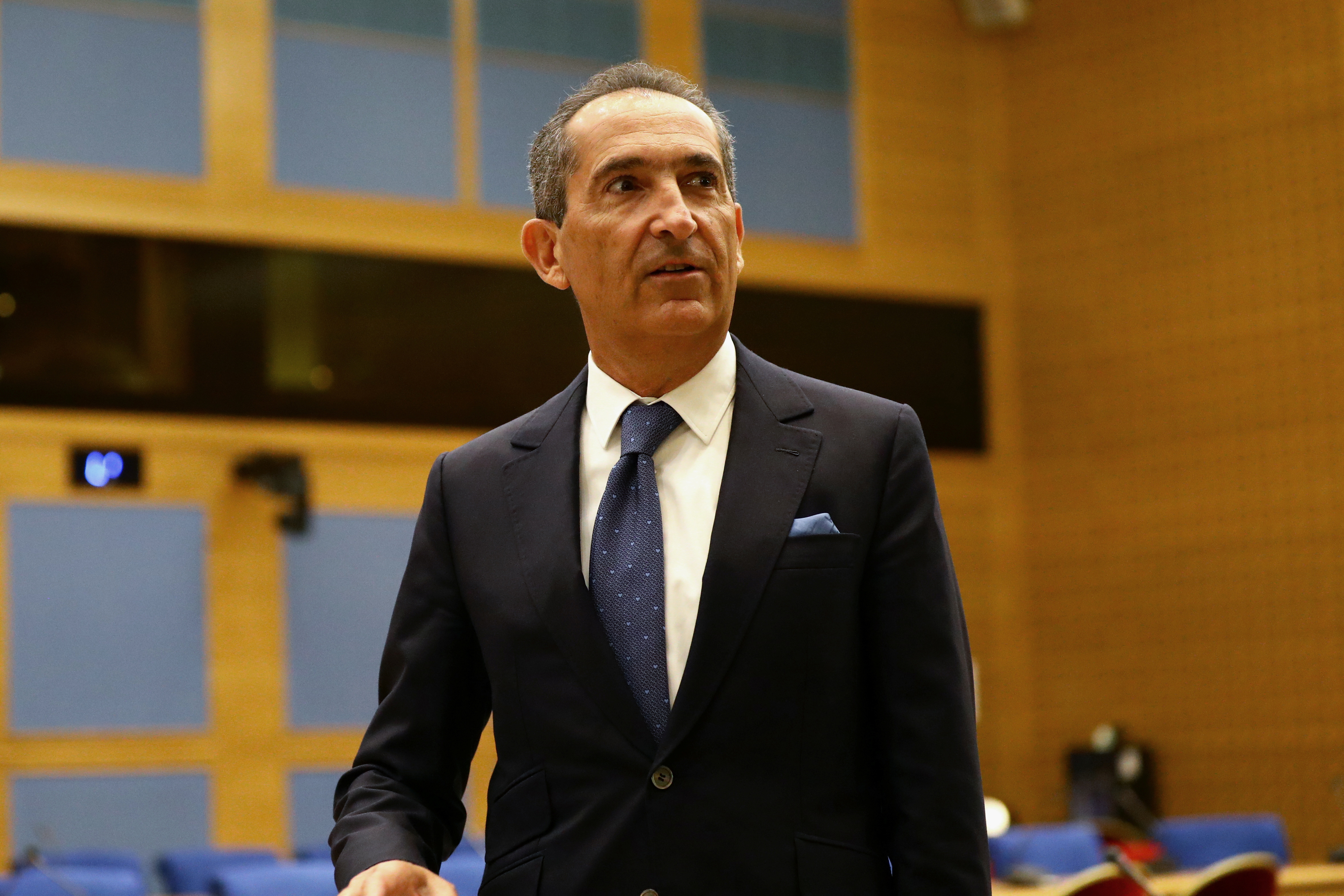[ad_1]

Patrick Drahi, the founder and controlling shareholder of telecoms and cable firm Altice, arrives for a hearing on the concentration of media ownership in the country, at the French Senate in Paris, France, February 2, 2022. REUTERS/Violeta Santos Moura
LONDON, Aug 8 (Reuters Breakingviews) – Altice’s debt is a bet for the bold. Patrick Drahi’s telecoms group is sitting on a $60 billion debt burden, and faces rising borrowing costs and a corruption investigation. Even with current high yields, the group’s bonds are a risky proposition.
Drahi’s debt woes are a tale of bold ambition. The 59-year-old Moroccan-born son of two maths teachers, who moved to France at the age of 15, used cheap debt to buy cable companies across Europe and the United States. Today his telecoms interests are split among three entities, all controlled or fully owned by Drahi – a French unit, an international business spanning Portugal and Israel, and Altice USA (ATUS.N). His reputation as a ruthless cost cutter has been undermined by a corruption probe into the company’s procurement processes, with Drahi’s right-hand man, Armando Pereira, placed under house arrest. Altice says it is the victim of the scandal, and Drahi has told investors he felt “betrayed”. Pereira denies any wrongdoing, according to his lawyer.
Even before the scandal broke in July, Altice was under pressure due to higher interest rates. Altice International, which operates in Portugal, Israel and the Dominican Republic, is the best performing of Drahi’s European assets, with revenues growing 4.6% annually in the second quarter of the year. The bigger worry is France, which has borrowing equivalent to 6 times trailing EBITDA. It is struggling from a costly fibre rollout, and fierce competition from Orange (ORAN.PA), Xavier Niel’s Iliad and Bouygues Telecom.
In the second quarter, Altice France’s revenue fell nearly 3% year-on-year, and EBITDA declined by 5%. Its cash flow was negative, after factoring in investment, interest, tax and working capital changes. Higher interest rates will make the debt burden more painful: the unit’s average cost of debt was less than 6% but even its least risky bonds, secured on the division’s telecoms assets, are now yielding nearly 9%. Altice France’s unsecured bonds, issued by its holding company, are even more beaten up: notes maturing in 2028 were worth less than 40% of face value, and yielding over 30%, on Monday.
Fixing France may take time. Drahi will therefore need to sell assets to cut debt, which starts to come due in 2025. He has options. Both Altice France and Altice International are trying to sell their data centre businesses, which could raise some 700 million euros, bankers say. Then there’s Altice’s media division, which operates 24-hour news channel BFM TV. That could be worth some 500 million euros, according to bankers.
Yet Altice France alone has some $19 billion of debt coming due by 2029. Drahi may therefore need to put the family silver on the table, such as his 50% stake in the French fibre business. Back in 2018 he sold a 49.9% stake in the unit, called XpFibre, for 1.8 billion euros. He could also try to sell Altice’s stake in its advertising business Teads, which was eyeing a $5 billion listing in 2021. As a last resort, he could try to raise capital from a private equity fund.
But timing may not be on Drahi’s side. Being a forced seller, he will find it hard to negotiate a fair price for his assets. And the corruption scandal may drag on, deterring potential buyers. The investigation into the 2014 collapse of Banco Espírito Santo, another big Portuguese scandal, has yet to be completed.
Altice’s debt’s juicy yields may appeal to bold investors. The securities could recover swiftly if Drahi can fix France and sell assets. Yet the mogul has a reputation as a cost cutter and financial engineer, less so a turnaround specialist. Creditors will need to believe that Drahi can pull one last rabbit out of his hat.
Follow @pamela_msg on Twitter
CONTEXT NEWS
French billionaire Patrick Drahi, founder of telecoms and media group Altice, said a Portuguese corruption probe was a “shock” and a “huge disappointment” on an Aug. 7 conference call with bond investors.
Armando Pereira, who co-founded Altice alongside Drahi, has been placed under house arrest in Portugal as part of an investigation into alleged corruption, his lawyer Manuel Magalhaes e Silva said. Pereira denies any wrongdoing, according to his lawyer.
Portuguese police said the investigation is focused on the group’s procurement process. The probe led to the suspension of Altice International’s co-CEO Alexandre Fonseca and other managers, employees and legal representatives in Portugal and elsewhere.
Altice France said in a statement on July 20 that following the investigation by the Public Prosecutor’s Office in Portugal it had taken pre-emptive measures including the launch of an internal investigation. It had also reinforced the approval process on all procurement, payments and purchase orders.
Drahi said on Aug. 7 he felt “betrayed by a small group of individuals”, adding Altice was the victim of the alleged wrongdoing. Drahi also said that the investigation in Portugal will have no impact on the group’s ability to pay its debts and announced he will meet creditors in New York and London in September.
Altice France’s 4% bonds maturing in 2028 have fallen in price to 37% of face value, and are yielding around 30%, according to Refinitiv prices. A year ago, the notes were trading at close to face value.
Editing by Neil Unmack and Oliver Taslic
Our Standards: The Thomson Reuters Trust Principles.
Opinions expressed are those of the author. They do not reflect the views of Reuters News, which, under the Trust Principles, is committed to integrity, independence, and freedom from bias.
[ad_2]
Source link
